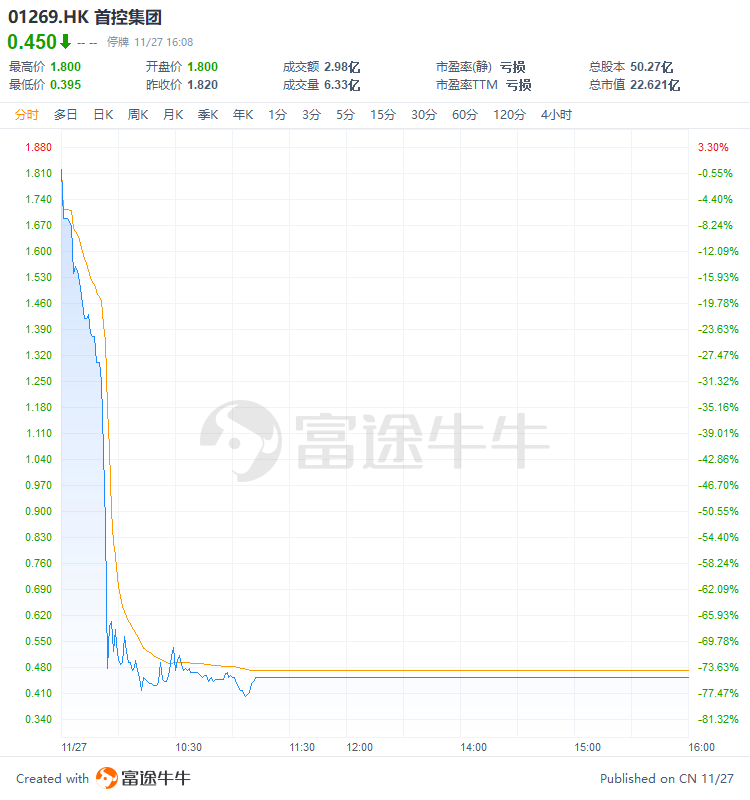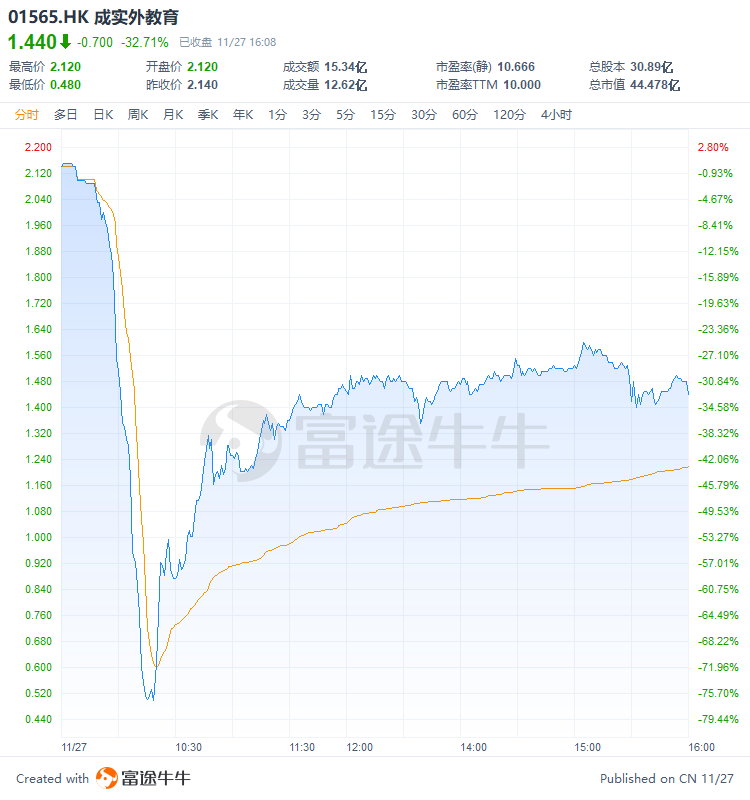See the flash collapse of Hong Kong stocks again!
What is different is that what happened today is a series of diving collapses of three stocks "one with two". The first Holdings Group suffered a bizarre collapse of more than 78% shortly after the opening of trading. Immediately after that, the share price of Chengshi Foreign Education also plunged instantly, with the deepest drop of more than 78%, and the market value lost HK $2.3 billion. Another stock, Accor Holdings, fell 21% at one point, with a market capitalization of less than HK $1.6 billion.
What happened?
Three Hong Kong stocks flashed off one after another
The first Holdings Group fell 78% in intraday trading.
On the morning of November 27th, the share price of the Hong Kong listed company first Holdings Group fell all the way after opening. At about 09:47, the share price plummeted 78.3% to as low as HK $0.395, hitting a four-year low while becoming fairy shares, and the market value of nearly HK $7 billion was instantly wiped off.

Then, at about 09:50, another Hong Kong stock, Chengshi Wai Education, also began to plummet, falling as much as 78 per cent to as low as HK $0.48, but then instantly rose above HK $1.

About 20 minutes later, around 10:10, 38 times Niu Accor Holdings, which had suffered a big loss of 50 billion yuan in market value, plunged again, falling as low as 21.15%, with a share price as low as HK $0.41, with a recent market capitalization of only HK $1.5 billion.

After the flash crash, the group announced at noon that it would temporarily stop trading on the Stock Exchange of Hong Kong from 11:12 on November 27, 2019, pending inside information about the company. As of the temporary suspension, the first Holdings Group fell 75.27% to HK $0.45 per share, with a latest market capitalization of HK $2.262 billion.

In response to the slump, the head of the Group responded to the media that the group is currently operating normally, and the relevant leaders are verifying the reasons. Communicate at any time, and please check the announcement in time.
In the afternoon, the decline of Chengshi Foreign Education continued to narrow, as of press release, the stock was at HK $1.45 per share, down 32.24%, with a total market capitalization of HK $4.48 billion. Accor Holdings shares also rebounded, as of press time, to 0.51 Hong Kong dollars per share, down 1.92%, the latest market capitalization of 1.534 billion yuan.
Three flash shares are related to each other.
After inquiring about the public financial results, we can see that it is not entirely accidental behind the diving collapse of the three stocks one after another. in fact, there is a certain equity relationship between the companies.
First of all, Chengshi Foreign Education is the company invested by the first Control Group. According to the semi-annual report data as of June 30, 2019, the first control group is the second largest shareholder of Chengshi Waiyu, with a shareholding ratio of 12.4%. Among them, 450 million shares of the company's major shareholders were pledged to Bank of China Ltd..

The first holding Group is also one of the shareholders of Accor Holdings. Accor Holdings' 2018 annual report shows that China first controls a 4.58% stake in Accor Holdings.
According to the Hong Kong Stock Exchange, China's first holding group now owns 1.61% of Accor Holdings, with a specific holding of 46.096 million shares with a market value of HK $21.665 million. On July 30, 2019, China first controlled the sale of 80 million shares of Accor Holdings, reducing its shareholding from 4.58 per cent to 1.61 per cent at a reduced price of HK $2.25 to cash out HK $180 million.

Accor's share price has been below HK $1 for a long time since its listing in 2013, and hit an all-time low of HK $0.25 in intraday trading on September 27, 2018. Accor's share price has tripled in less than a month, from HK $5.6 in early November to an intraday high of 14.9 on November 20.
Accor rose nearly 6000 per cent, or 60 times, from HK $0.25 to HK $14.96 in more than a year. Some analysts said that it was precisely after the cash out of the first control group that Accor Holdings began to soar.
Just recently, Accor once again became a star stock after plummeting 98% in one morning.

All this went up in smoke on the morning of November 21st. On that day, the lowest intraday price of Accor Holdings hit 0.246, the lowest since the stock went public. At around 11:00, MSCI announced that Accor Holdings would be excluded from the scope, and trading in the shares was suspended immediately.
Two transformations in three years
The performance of the first control group is low.
In the three years from 2014 to 2016, the first holding Group completed two transformations from auto parts manufacturers to financial stocks and then to large acquisitions and expansion aimed at the trading industry.
How effective is the bold transformation?
Before 2014, the Hong Kong-based head Control Group was mainly engaged in the auto parts business, according to the official website. When it was listed on the main board of the Hong Kong Stock Exchange in November 2011, the main control group is still called "China vehicle parts" and is a well-known manufacturer of car shock absorbers in China.
However, after the listing of Chinese car parts soon suffered a performance shock, the company's earnings and net profit fell in 2012, especially during the year, the group's gross profit and other income fell sharply, resulting in a sharp decline in net profit by 87%, which once hurt its vitality. And failed to recover in the next two years.
Since the end of 2014, it has been involved in the financial services business, providing listing sponsorship, underwriting and placing, securities trading and financial credit services.
In 2015, the company continued to actively layout finance-related business, and successively acquired Shenzhen Guanqiao Immigration Consulting Co., Ltd. And Shenzhen Juntuo Immigration Consulting Service Co., Ltd. In July 2015, China Auto parts announced plans to change its name to "China first Control Group" to provide the company with a new corporate image and identity. In September of the same year, the company changed its name to first Control Group.
However, the results of the transformation were not satisfactory, and the company's operating performance changed from profit to loss in that year.
Since 2016, the first Control Group has become more diversified in its business and formally launched its education investment business, hoping to transform education to improve its profitability.
Statistics show that in 2016 alone, the first Control Group invested at least 1 billion yuan in the development of education business through acquisitions, capital injection and holding shares in relevant education companies.
For the whole year of 2016, the first Control Group successfully turned a loss into a profit and made a net profit of 179 million yuan. However, the good times did not last long, and in 2017, the group's operating results did not continue the strong momentum of the previous year, and the annual profit changed from profit to loss again, with a loss of more than 300 million yuan. By 2018, the company's annual net loss will increase 3.6 times to 1.387 billion yuan.

The company's share price has plummeted nearly 95% in the past year and a half.
Under the repeated fluctuations in performance, the performance of the first Control Group in the secondary market has also declined all the way.
In terms of share prices, the shares of first Holdings have fallen from a high of nearly HK $18 since 2017, hovering around HK $2-3 in the second half of last year until today's flash crash.
It is worth mentioning, however, that the share price changed from the beginning of April to the end of May this year, more than doubling in two months. Specifically, the market capitalization of the first Holdings Group, which was included in the MSCI Hong Kong Index on May 14, 2018, has more than tripled in the previous three months, and its shares have fallen since June 1.
In terms of share price performance in the past two years, since May 31, 2018, the company's share price has slipped from a high of HK $8.24 to HK $0.45 before today's temporary suspension, falling by as much as 94.5%, while its market capitalization has shrunk from HK $41.422 billion to HK $2.262 billion. Nearly 40 billion of the market capitalization has evaporated.

Edit / emily
